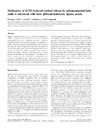Identificador persistente para citar o vincular este elemento:
https://accedacris.ulpgc.es/jspui/handle/10553/1548
| Título: | Modulation of ACTH-induced cortisol release by polyunsaturated fatty acids in interrenal cells from gilthead seabream, Sparus aurata | Autores/as: | Ganga, Rachid Tort, L. Acerete, Laura Montero, D. Izquierdo, M. S. |
Clasificación UNESCO: | Investigación | Palabras clave: | Dorada (Peces) Alimentación Ácidos grasos poliinsaturados |
Fecha de publicación: | 2006 | Proyectos: | AGL-2003-03112 (Ministerio de Educación) | Publicación seriada: | Journal of Endocrinology | Resumen: | Highly unsaturated fatty acids are essential components of cellular membranes of vertebrates and can modulate physiological processes, including membrane transport, receptor function and enzymatic activities. In gilthead sea bream, dietary deficiencies of essential fatty acids of marine fish raise the basal cortisol levels and alter the pattern of cortisol release after stress. The aim of the present study was to clarify the effect of different essential fatty acids on adrenocorticotropic hormone (ACTH)-induced cortisol production and release in fish, through in vitro studies of sea bream interrenal cells maintained in superfusion and incubated with different types of fatty acids and eicosanoid production inhibitors. Results showed the first evidence of the effect of certain fatty acids on cortisol production by ACTH-stimulated interrenal cells in fish. Both arachidonic acid (ARA) and particularly eicosapentaenoic acid (EPA) promoted cortisol production in sea bream interrenal cells. Moreover, incubation with indometacin (INDO) reduced the increased cortisol production induced by EPA and ARA, suggesting mediation by their cyclooxygenase-derived products. Docosahexaenoic acid stimulated cortisol production to a lesser extent than that caused by EPA or ARA, but the inhibitory effect of INDO was not as marked as it was for the other fatty acids. In contrast, supplementation with dihomogammalinoleic acid reduced cortisol production, denoting the inhibitor effect of this fatty acid in cortisol secretion. | URI: | https://accedacris.ulpgc.es/handle/10553/1548 | ISSN: | 0022-0795 | DOI: | 10.1677/joe.1.06770 | Fuente: | Journal of Endocrinology [ISSN 0022-0795], v. 190, p. 39-45 |
| Colección: | Artículos |
Citas SCOPUSTM
63
actualizado el 08-jun-2025
Citas de WEB OF SCIENCETM
Citations
63
actualizado el 22-feb-2026
Visitas 5
321
actualizado el 16-ene-2026
Descargas
276
actualizado el 16-ene-2026
Google ScholarTM
Verifica
Altmetric
Comparte
Exporta metadatos
Los elementos en ULPGC accedaCRIS están protegidos por derechos de autor con todos los derechos reservados, a menos que se indique lo contrario.
